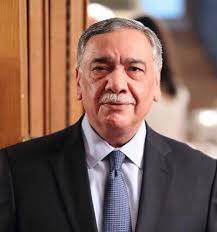ISLAMABAD - In the process of sprucing up rather revolutionizing the judicial system in the country, the establishment of Model Criminal Trial Courts (MCTC) is on the cards which will translate the vision of Chief Justice of Pakistan Justice Asif Saeed Khosa for clearing the huge backlog of cases pending in the courts across the country.
These model courts would be established at district level throughout the country under the ‘Expeditious Justice Initiative’ – a roadmap to time-bound criminal trial regimen, sources privy to the developments taking place on this front shared the information with The Nation on Wednesday.
These sources further informed that the initiative focuses on the four core objectives including improvement in service delivery of criminal justice system by introducing time-bound criminal trial regimen; reduction in the shelf life of criminal cases through efficient trial management; fixation of timeframe for conduct of criminal trial by introducing trial scheduling and to make trial management a coordinated effort by key players.
They further said that the concept of model courts is primarily a brainchild of two dynamic personalities of Pakistan judiciary -- Chief Justice Asif Saeed and Justice Mansoor Ali Shah -- who discussed the challenges facing the judicial system and decided to establish a pilot project by establishing model courts in four districts including Attock, Chiniot, Narowal and Vehari in 2017.
They added that it was envisioned by the Chief Justice of Pakistan that instead of demanding perfection from other key players and blaming the system, “we have to take initiative by utilizing the available resources within the existing legal framework.”
While addressing the launching ceremony of this pilot project at Punjab Judicial Academy in January, 2017 in Lahore, Justice Asif Saeed had said, “It will be a ‘CPEC’ in judicial history of Pakistan.”
These model courts conducted hearing into three types of cases including murder, narcotics and other than murder cases. By keeping in view the success rate of these courts, two more districts including Mandi Bahauddin and Lodharan were also made part of this pilot project just after one-and-half-months of its launching. Later, a bigger district Rawalpindi was also included and it was headed by the then district and sessions judge Sohail Nasir.
Later, a performance study was carried out which showed a remarkable and unmatchable success of these model courts. It is also evident from the data which showed that a total number of 8 model courts decided 1,458 cases and recorded statements of 6,488 witnesses in only 167 working days. In comparison, 40 normal courts in Punjab decided a total number of 5,402 cases and recorded the statements of 26,695 witnesses.
The officials told that seeing this success, Justice Mansoor Ali Shah, the then Chief Justice of Lahore High Court, had remarked, “It is a magic.”
Sharing details of this success, they said that the team of the project persuaded lawyers and cases were scheduled. Similarly, dedicated prosecutors were engaged and police of the area were involved while focal persons for every concerned department were appointed and e-rooms were established at hospitals for recording of statements of doctors through video-link.
In the background of successful experiment of Model Courts in the province of Punjab in 2017, the establishment of Model Criminal Trial Courts (MCTC) has been made one of the distinctive features of the Expeditious Justice Initiative which has been approved by National Judicial (Policy Making) Committee (NJPMC) in its recent meeting held under the chair of Chief Justice of Pakistan Justice Asif Saeed Khosa.
The meeting was attended by Justice Gulzar Ahmed, Senior Puisne Judge Supreme Court of Pakistan on special invitation. The other members of the NJPMC including Chief Justice, Federal Shariat Court Sheikh Najam-ul-Hassan, Chief Justices of the Provincial High Courts including Justice Ahmed Ali M. Sheikh, Chief Justice High Court of Sindh, Mrs. Justice Tahira Safdar, Chief Justice High Court of Balochistan, Justice Waqar Ahmad Seth, Chief Justice Peshawar High Court, Justice Sardar Muhammad Shamim Khan, Chief Justice Lahore High Court and Justice Athar Minallah, Chief Justice Islamabad High Court and unanimously approved the initiative.
The basic purpose of the initiative was to introduce a time-bound mechanism for trial of case in line with the constitutional requirement of dispensation of expeditious and inexpensive justice. However, the officials negated the news circular in the air that these courts would conclude the cases within four days. They termed it as misconception saying that rather these courts would hear the cases on day to day basis.
The officials said that the High Court will nominate one judge for MCTC in each district in consultation with district and sessions judge concerned. Each MCTC will be manned by Additional Sessions Judge. In districts where there is no Additional Sessions Judge posted, the court of Sessions Judge may be notified as MCTC.
MCTC will be housed in spacious court rooms with digital facility and uninterrupted power supply and MCTC will be fully equipped and furnished so as to remain online with Monitoring and Evaluation Cell (M&EC) round the clock.
They concluded that the initiative will introduce time-bound criminal trial regimen by operationalization of Model Criminal Trial Courts in all districts and the regimen is likely to be extended to all criminal trial courts in a due course while after successful execution of the initiative for six months, the Research Wing of the Federal Judicial Academy will conduct its impact study on criminal justice system.






